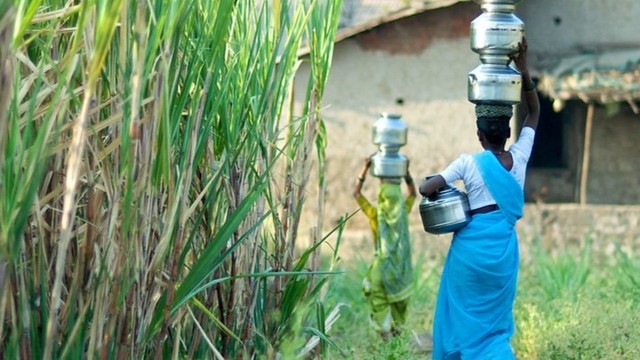Can Europe’s new deforestation regulation address concerns about trade and climate justice?
The European Union’s Deforestation Regulation has provoked a backlash from producer countries who argue that it will put a disproportionate burden on them, and increase climate injustices



Deforestation in the Amazon in Brazil (Photo: Sentinel Hub, via Flickr, CC BY 2.0 Deed)
High consumption levels in wealthier countries have long driven environmental destruction around the world. This includes the destruction of natural forests to produce agricultural commodities, which escalates biodiversity loss and intensifies climate change by releasing carbon emissions and removing carbon sinks.
The European Union's Deforestation Regulation (EUDR), which came into effect in June 2023, aims to address this by requiring businesses to prove that the production of certain commodities did not cause deforestation.
This ambitious legislation could help reduce forest loss, but its impacts beyond Europe’s borders have drawn accusations of ‘regulatory imperialism’ from producer countries.
The backlash highlights the need for environmental action to take a consultative approach and advance climate justice principles.
What is the EUDR?
The EUDR prohibits placing cattle, wood, cocoa, soy, palm oil, coffee, rubber and some of their derived products on the European Union (EU) market if they are linked to deforestation. From December 2024, large businesses will be required to carry out due diligence, including geospatial monitoring, to prove their produce is compliant (the transition period is longer for small and medium-scale enterprises).
The EU will classify producing countries based on three risk levels: low, standard or high. This will enable EU regulators to target and trace products from countries considered high-risk, with simplified due diligence for low-risk countries.
The EUDR follows earlier EU attempts to address deforestation, namely a prior regulation on timber and a set of Voluntary Partnership Agreements (VPAs) that the EU negotiated with certain timber exporting countries, such as Indonesia (PDF).
Unlike these earlier efforts, the EUDR takes a unilateral approach, applied through EU legislation rather than international negotiation, and directly defining sustainability criteria besides requiring businesses to comply with national law in producer countries.
The EUDR also goes further in that it seeks to address deforestation caused not just by timber harvesting but by the expansion of agricultural activities.
What it means for producer countries
Initial forecasts suggest that the EUDR could impact an estimated US$401.1 billion in annual exports to the EU, mainly from developing countries that host most of the world’s remaining rainforests.
According to research by non-governmental organisation FERN (PDF), Brazil, Argentina, Côte d’Ivoire, Ghana, Indonesia, Malaysia and Viet Nam supply a large share of the commodities affected; and the economies of Côte d’Ivoire, Honduras, Ghana and Cameroon are particularly dependent on exporting to the EU so are likely to be worse hit.
As a result of this regulation, we are already seeing reports of shifts in sourcing, with EU coffee importers scaling back purchases from Ethiopia and turning towards the more traceable, larger-scale Brazilian farmers.
Producer countries have voiced deep concerns about the EU's unilateral legislation and what they consider a disproportionate burden placed on developing nations to adjust production practices and supply chains at their own cost.
In September 2023, 17 governments across Latin America, Africa and Asia sent a joint letter to EU leaders (PDF) arguing that the EUDR's one-size-fits-all approach disregards local conditions; highlighting potential inconsistencies with World Trade Organization rules; and calling for a more consultative approach.
While large-scale businesses dominate production and trading for some of these commodities, the new regulation is likely to particularly impact Indigenous and small-scale farmers, who are already squeezed in global supply chains (PDF), even in sectors where smallholders have proved competitive on global markets, such as cocoa and coffee.
Producer nations are also concerned that benchmarking countries based on risk levels could harm a country’s reputation and hinder its ability to secure fair prices on global markets.
Who should bear the cost?
The EU’s unilateral approach may reflect frustration with the slow pace of previous sustainability initiatives. It took years to negotiate and operationalise the VPA with Indonesia, which focuses solely on the timber sector. This highlights the inherent challenges of reaching consensus and implementing change across complex global supply chains.
At the same time, the concerns raised by producer countries question adherence not just to global trade rules but to climate justice principles, because of how the costs of environmental action are distributed across states.
For example, the principle of ‘common but differentiated responsibilities’, enshrined in multilateral climate agreements, affirms that all states share responsibility for protecting the planet. But it also recognises the differentiated historical contributions to environmental problems, with richer countries bearing greater responsibility.
Depending on how it is implemented, the EUDR could add a significant burden on producers and exporters in developing countries to meet compliance costs. Cumbersome compliance requirements could particularly penalise smallholders – who have contributed little to global climate change and who, as the joint letter noted, could be excluded from the EU market "not because they have deforested their land but due to their inability to show compliance".
Taking a more consultative approach
The EU has launched several initiatives to mitigate concerns about the EUDR and support its implementation, such as the EU Observatory on Deforestation and Forest Degradation and the Team Europe Initiative on Deforestation-free Value Chains (PDF). In addition, Article 30 of the EUDR requires the EU Commission to develop a ‘comprehensive strategic framework’ for engagement with producer countries, which could help shape implementation instruments still being developed.
These initiatives aim to facilitate dialogue and provide support to producer countries, including on the role of smallholders in supply chains. But with such initiatives still taking shape, and only a few months left for businesses to begin the compliance process, their effectiveness in addressing the EUDR's impacts, at least in the short term, remains to be seen.
Engagement processes are likely to highlight some tricky dilemmas, including in the context of bilateral negotiations. For example, the EU-Mercosur Trade Agreement is currently stalled partly over concerns about climate and deforestation. Brazilian officials have expressed worries that the value of the agreement’s benefits in terms of access to the EU market may be undermined by the EUDR and by any further EUDR-style unilateral action.
With the stakes so high, also due to the EU’s need to access critical minerals in Latin America, the EU might come under pressure to award a ‘low-risk’ rating to Mercosur countries under the EUDR so they can finalise the trade agreement. But this kind of horse-trading could undermine the EUDR's environmental goals and turn it into an instrument for political objectives rather than tackling deforestation.
This situation also raises questions about how producer countries that lack Brazil’s market clout could have their own concerns taken on board.
Putting climate justice first
The EUDR could still be an opportunity to tackle the drivers of deforestation, including through more effective implementation of national regulations in producer countries. Equitable partnerships and effective support to developing geolocation data might enable organised small-scale producers to demonstrate their advantage in sustainability, relative to the large-scale plantations, and to negotiate fairer prices.
But effective implementation ultimately hinges on support in producer countries. Shifting to a more collaborative model with governments, civil society and organisations of small-scale growers in producer countries could help address concerns and build trust.
In an interdependent world, effective responses to environmental problems require concerted approaches that place climate justice at centre stage.




